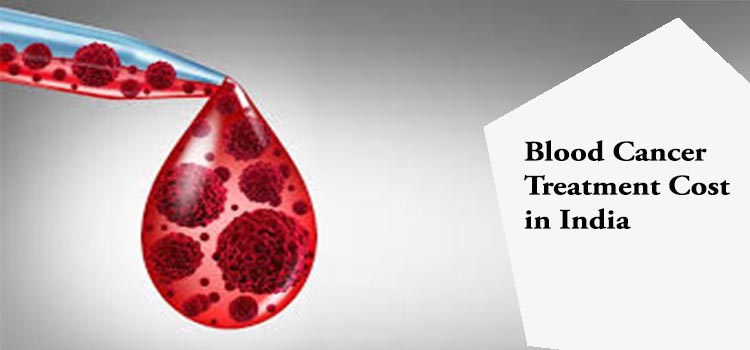Blood Cancer Treatment Cost in India

Cancer is a disease feared by many for a good number of reasons including its devastating physical and mental effect on the patients, a small window of treatment, and most important of all, the fact that it is in some cases a fast-spreading disease that can affect various parts of the body and prove to be fatal.
One of the common manifestations of cancer is in the form of Blood Cancer, also known as Leukemia.
What is Blood Cancer?
Every second million of blood cells are produced in bone marrow and get released in blood to perform their specific function like maintaining immune response (WBC) supplying oxygen (RBC) or clotting bleeding (platelets).
Blood cancer is the type of cancer that affects the bone marrow, where the entire process of the blood cell production initiates. It causes the growth of an abnormal type of blood cell and interrupts production of essential blood cells (RBCs, WBCs, and platelets). The primary types of blood cancer include Leukemia, Lymphoma, and Myeloma. Every 3 minutes a person gets affected by blood cancer contributing to a total of 60,300 new cases this year globally as per the National Cancer Institute.
Leukemia is a condition in which the production of Red Blood Cells are affected, Lymphoma affects the production of white blood cells and Myeloma which causes a problem in the production of plasma cells.
What are some risk factors for Leukemia?
Gender: Cases of blood cancer is majorly seen in males as compared to females.
Age: The risk of blood cancer significantly increases with an increase in the age of an individual.
History and Background: Most of the cases of cancer are not associated with genetic causes but history of blood cancer in family, especially in first degree relatives may increase the risk.
Lifestyle: Lifestyle choices like consumption of cigarettes, working in hazardous environments can increase the chances of cancer.
Blood disorders: Blood disorders like myelodysplastic syndrome can also become a causing factors to Leukemia.
What are the symptoms of Leukemia?
Some common symptoms are joint pain, swollen lymph nodes, fever, weakness, frequent infections, abdominal discomfort, weight loss, appetite loss. However, the symptoms differ according to the stage of cancer. At a later stage when cancer spreads to other body organs like the lungs, Heart, Testes, Kidneys or Gastrointestinal tract, it may cause a problem in their function and organ-specific symptoms may arise.
What are the various types of Leukemia?
Acute Leukemia is a rapidly growing, severe form of the disease. This form may be either lymphocytic, known as Acute Lymphoblastic Leukemia (ALL) which affects the lymphoid group of white blood cells, or myeloid, known as Acute Myeloid Leukemia (AML) affecting the myeloid group of white blood cells)
Chronic Leukemia is a slower growing variant, that usually affects adults over the age of 55. Chronic leukemia may again be lymphocytic (Chronic Lymphocytic Leukemia, or CLL) or myeloid (Chronic Myeloid Leukemia, or CML).
How is Leukemia diagnosed?
Doctors who specialise in the diagnosis and treatment of diseases related to blood are known as Hematologists. Haematologist-Oncologists specialise in blood cancer diagnosis and the treatment of leukemia and other cancers.
Your medical history and a physical examination may be conducted to look for signs of leukemia. A sample of your blood may be observed under a microscope and a bone marrow biopsy may also be used.
Acute leukemia requires treatment soon after diagnosis. Once remission is achieved, treatment may still periodically continue to prevent a relapse. While it is unlikely to cure chronic leukemia, therapy helps in controlling and managing the symptoms.
How do you treat Leukemia?
There are various approaches to treating leukemia and like most other diseases, the most suitable approach will be determined by the type, severity of the disease, and whether or not the cerebrospinal fluid has been affected by the cancer cells. The patient’s age and health are also a deciding factor.
Chemotherapy, Radiotherapy, Bio-therapy, Stem Cell Transplants are the various ways to treat leukemia and a combination of the above may also be used.
What is Chemotherapy?
Chemotherapy is a treatment option which involves the use of drugs to avoid the division and growth of cancer cells by killing them. The effectiveness of this treatment depends upon the stage of cancer. The earlier it is delivered, better are the chances of cure.
What is radiotherapy?
It is a treatment option that uses radioactive waves to treat cancer. The radiotherapy can result in killing existing blood cells, slowing down the growth rate of cancer cells, shrinking the size of a tumour. Often this treatment option is used with other methods like surgery to enable effective treatment and complete removal of cancer cells.
What should you do if you are diagnosed with Blood Cancer?
When you are diagnosed the first thing to do would be to get a treatment plan from your doctor. This treatment plan may be very specific to your case considering the stage of cancer and its severity. Once you get your treatment plan instead of heading for a treatment right away, a better thing to do would be to seek for a second opinion. A Second opinion will not only confirm the diagnosis but will also help you explore various treatment options.
After you are done with taking a second opinion and are ready to stick to a treatment plan, you might also need to consult a dietician to lay down a list of dietary changes you are required to make.
What else should I know?
While being treated, you will face a loss in the number of white blood cells, hence making you vulnerable to other diseases. Doctors may use supportive treatment options to counter these downsides. You may also need supportive treatment to minimise the unpleasant side effects of your therapy.
You may be administered with vaccines, anti-nausea medication, blood transfusions, various antibiotics, and immunoglobulins. Treatments to increase the growth factor of Red and White blood cells may also be used.
How do I go forward with treatment?
You can start by looking for some of the renowned hospitals in cancer treatment near you. However, if the blood cancer treatment cost is too high in your home country there is no harm in looking for countries with cheaper options. For instance, the leukemia treatment cost in India is much more affordable than those in western countries. India is also home to some of the world’s best and most experienced Hematologists and Oncologists. Going to India for blood cancer treatment would be economical while providing you with quality medical treatment.
What should you look for while getting treated elsewhere?
Travelling to a different region or another country altogether, for treatment may sound intimidating, but if done right, it could give you the benefits of a quality healthcare and affordable expenses.
Your best bet is to look for reputed hospitals with good facilities, infrastructure and most importantly experienced oncologists.
What if I need help?
If you choose to get treated in other countries, look for organisations that can offer you all-round support, from guidance and consultations to help with finding the right hospitals.
As mentioned above, the leukemia treatment cost in India is a fraction of what it will cost you elsewhere, so if you choose to get treated in India, look for similar organisations or support groups.
MedMonks, an established medical travel company can help you with the whole process from virtual consultation to help regarding second opinions, providing you with an estimate of the total expenses of blood cancer treatment in India. The company comprises of a highly experienced team of doctors who guide patients from around the globe who seek top-notch quality treatment at affordable prices.





